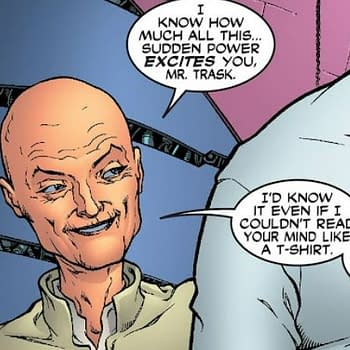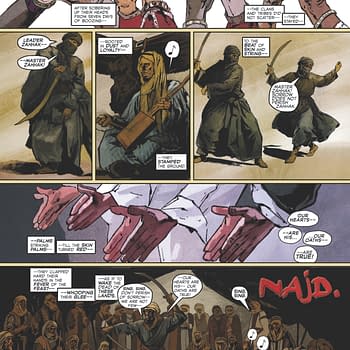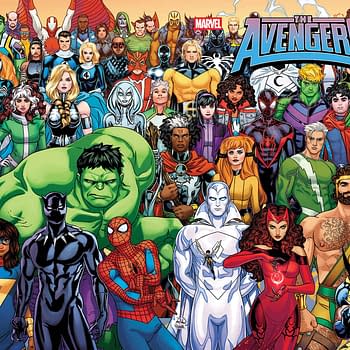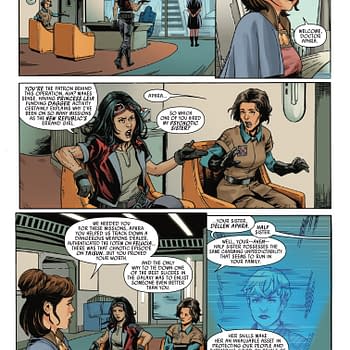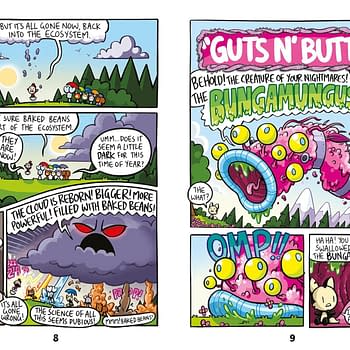Posted in: Comics | Tagged: avengers, david lapham, george perez, Gerry Conway, Harbinger, Jim Shooter, Steve Englehart, x-o manowar
Jim Shooter Said, Steve Englehart Said
In a long discussion on the topic of whether heroes should or should not kill on Jim Shooter's blog, the conversation, as it invariably does in an open, online discussion, veered off in multiple tangents, one of them being tying characters into real world time and events. This lead to one commenter posting, "The problem, though, is that the impression given by such storytelling is that only 12 exciting things a year can happen to each of your titles, or else you have to do like you did with Harbinger and keep the kids in comas for months on the on moon."

"The reason the Harbinger kids were in a coma for months on the moon was because I trusted Steve Englehart to write a book, X-O Manowar, and he ignored our tight continuity to the point that I had to have months pass for the Harbinger kids to make our planned and solicited crossover work. When I caught what he'd done there was no time to fix it in his book, so I had to make adjustments in other books. I confronted Steve about it and he informed me that he deliberately ignored continuity obligations, that he would do whatever he damn well pleased and that I would have to adjust to his plans, not vice versa. So I fired him. Catching up with the calendar or synchronizing between titles doesn't have to be that awkward."
I emailed Mr. Englehart asking him about this account. He replied;
"It's completely false – no semblance of truth whatsoever – and I'm really amazed that Jim said that (if you've quoted him accurately). As I've said on many occasions, and say again now, he asked me to write X-O for him, in his style, and told me that when I started my own book, Shadowman, I could write it my way. When I wrote the first Shadowman, he came to me and said he was really sorry, but he wanted all the books to sound as if they were written by the same guy, and he could not let me write Shadowman my way. He also said, and this is the important point, that it was okay with him if I told people what had happened, because he had broken his word and felt bad about it.
"That's it. There was never at any time any talk of ignoring continuity in X-O, or any "problem" other than not sounding like Jim. And in light of his rather noble mea culpa at the time, I find it hard to believe that he's saying anything different now. If he really did say that…words fail."

"The biggest single problem with Marvel editorial in those days was lateness. There was a steady stream of unscheduled reprints and outright missed issues that caused tremendous problems, cost a great deal of money and ultimately severely impacted sales.
"Englehart was a major contributor to the problem. I believe that he was assigned three books a month, but he rarely delivered even two. One of his assigned titles was the Avengers, a monthly. There was a year…1975? during which Englehart delivered only six or eight Avengers scripts, meaning that the rest of that year's issues were reprint or non-existent. Remember the "Dreaded Deadline Doom?" It struck frequently back then. ….
"Englehart was supposed to deliver the script for Avengers…hmm…#150? I think. It was a "landmark" issue. The script didn't arrive by the date promised, which was months late already, by the way. Gerry {Conway} asked me to dialogue the issue overnight. I did. The issue with my dialogue went into lettering and production the next day.
"That led to a rather dramatic phone conversation between Englehart (who lived in California) and Gerry. Though his office door was closed, those of us in the big editorial room outside could hear clearly Gerry's side of it. Gerry tried to reason with Englehart. Gerry was as sane, reserved, respectful and nice as he could be under the circumstances. Englehart was obviously irate. Make that enraged.
"I think that's when Englehart quit. Or soon thereafter. "Editorial policies" had nothing to do with it, unless you consider "Deliver the damn thing already" an editorial policy."
As for the specific issues Shooter references above, Avengers #136 reprinted three pages from Amazing Adventures #12, #145 and #146 were fill-ins, and #150 featured just six pages of new material. Three people – Gerry Conway, Shooter, and Englehart – would script #151, and #152 would feature an uncredited plot from Englehart would run in #152 with scripting by Conway, and the book was solely Conway's with #153.
Lest someone think that the delays might have been due to the artist, George Perez, and not the writer, as Perez has honed lateness to perfection in his later years, original artwork from #149 has notes from Perez complaining about the delays on the book and how they were affecting him.








